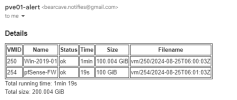Is this true? I have 4 PVE servers, and want to stagger their backup start times. All of them have 1GB Ethernet connection.
I was running a test to backup 5 VMs on one server - 1 active VM the others are not running. It appears that it backs them up 1-at-a-time (i.e. 100, then 101, then 102, etc.)?
Is there no way to change this so that more than 1 at a time can backup? This is my home-lab, and even if backing up nightly for all the VMs, it will take 8-10 hours (based on how long it took just one VM to backup (1-100GB drive and 1-60GB drive).
I was running a test to backup 5 VMs on one server - 1 active VM the others are not running. It appears that it backs them up 1-at-a-time (i.e. 100, then 101, then 102, etc.)?
Is there no way to change this so that more than 1 at a time can backup? This is my home-lab, and even if backing up nightly for all the VMs, it will take 8-10 hours (based on how long it took just one VM to backup (1-100GB drive and 1-60GB drive).


